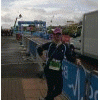Search the Community
Showing results for '{query}'.
Found 425 results
-
I was in a similar situation to you whereby my whole family lives far away (Europe!) and I did not feel comfortable advertising to the whole world that I'm having lap band surgery. i actually went to the hospital and came home by myself. I've been told that 99% of people recover incredibly quickly (you even surprise yourself!) so I'm sure you'll be fine as well. I would strongly suggest staying in hospital overnight as having nurses and doctors around you would give you some reassurance that if something goes wrong they are there to assist. Once you are past 24hr (i.e. 24hrs post surgery) you'll probably feel no worse then when you are recovering from a cold. By 3rd day you can pretty much do your usual things (go to shop, go for a walk, have a shower, clean your house, etc.) but you might get tired quicker then usual and that shoulder pain might still bother you. In my personal experience having moral support for the the first 12-24hrs would really help. I had my surgery on Sat afternoon @ 1pm and stayed at hospital until tomorrow morning 10am. The day of the surgery was horrible - pain, discomfort, incisions hurt, unbearable shoulder pain (from gasses pumped into you during surgery) grogginess from anesthesia, and in my case a major dose of self-pity why/how did I allow myself to get to this point, why am I inflicting myself so much pain, I want all of this to disappear, etc. Luckily you start feeling much better 6-9 hours post surgery so these thoughts disappear. Woman next door had a friend with her most of the time who provided moral support throughout the evening and that really helped. Even listening (really eavesdropping) on their conversation helped me. By 9-10pm, I was off IVs and started feeling generally better. I started walking a few steps around 9pm and by 11pm I was doing laps around the hospital ward. No major problems sleeping, particularly if you get painkiller for shoulder pain. By 9am tomorrow morning I was itching to go home. I live in New York City so @ 10am I was already in taxi on the way home. Once at home I went for @ 2hrs nap and then for 2hrs slow walk along the Central Park. Interestingly enough you feel minor pain around your incisions (particularly when you stretch or when you are getting in and out of bed) but you don't feel pain of the band, no pain walking around the town, etc. They don't recommend lifting anything >10lb (even if you feel you can do it easily like I did). I stocked up on protein shakes but forgot water and multivitamins so I had to go out and buy some. I carried about a gallon of water and 2-3lb of various multivitamins home with no issues. Having friends stop by or call for moral support worked wonders. On Monday afternoon (surgery was on Saturday) I went back to hospital to pick up liquid painkiller and on a way back found myself in a subway station with 6 long flights of stairs to climb in order to get out (escalators broke down). While I was able to get to the top OK I felt a real shortness of breath when I got to the top but no pain. (Anesthesia and hospital stay really affect how much you can breath in the days after surgery!) Once I recover my breath (I had to sit down for 3-4 min) I realized that I climbed equivalent of 5-6th building floors 48hrs after the surgery. From that point I new I'd be good as long as I take it easy and do what I can. Hope this helps. Any queries just let me know. Good luck! PS. All my self-doubt and despair about the surgery disappeared within 24hrs. While the day of the surgery was horrible I would still recommend it to anyone needing it.
-


No butt at all but big belly and sliding pants!
Clare Q. replied to beckyboop74's topic in POST-Operation Weight Loss Surgery Q&A
Not one single solution to the original query: what does a man do to get a pair of jeans to fit well if he has a larger than usual belly and a flat butt. -


Dr. In My Area No Longer Does Lapband. Ugh!
Madam Reverie replied to Essence33's topic in Weight Loss Surgery Success Stories
Here is an academic overview of the various bariatric procedures with a bit of excess 'science stuff' thrown in. No opinion. No bias. Published 2012 by the UK Royal College of Physicians. If anyone requires further clarification to the sources contained (hopefully its been copied successfully), please see the reference list at the end. This will provide you (licensing permitting) with a link to those original source documents so you can do your own further research/analysis. Any questions or queries, please do not hesitate to ask. Revs x Overview of bariatric surgery for the physician Keng Ngee Hng, Specialty registrar in gastroenterology1⇓ and Yeng S Ang, Consultant gastroenterologist and honorary lecturer2 + Author Affiliations 1Salford Royal NHS Foundation Trust 2Faculty of Medicine, University of Manchester, Oxford Road, Manchester Address for correspondence: Dr KN Hng, 4 Fern Close, Shevington, Wigan WN6 8BL. Email:keng_ngee@hotmail.com Abstract The worldwide pandemic of obesity carries alarming health and socioeconomic implications. Bariatric surgery is currently the only effective treatment for severe obesity. It is safe, with mortality comparable to that of cholecystectomy, and effective in producing substantial and sustainable weight loss, along with high rates of resolution of associated comorbidities, including type 2 diabetes. For this reason, indications for bariatric surgery are being widened. In addition to volume restriction and malabsorption, bariatric surgery brings about neurohormonal changes that affect satiety and glucose homeostasis. Increased understanding of these mechanisms will help realise therapeutic benefits by pharmacological means. Bariatric surgery improves long-term mortality but can cause long-term nutritional deficiencies. The safety of pregnancy after bariatric surgery is still being elucidated. Introduction Obesity is a worldwide pandemic,1–4 with the number of obese children and adolescents increasing alarmingly.5 This has serious health and socioeconomic implications due to the attendant increase in related comorbidities.1,2,4,6 Obesity causes type 2 diabetes, hypertension, dyslipidaemia, cardiovascular disease, obstructive sleep apnoea, obesity hypoventilation syndrome, cancer, steatohepatitis, gastro-oesophageal reflux, gallstones, pseudotumour cerebri, osteoarthritis, infertility and urinary incontinence.1–6 Severe obesity reduces life expectancy by 5–20 years.1 Diet, exercise and drug treatments for severe obesity have been disappointing.1–3,5–12 At the present time, bariatric surgery is the only treatment that reliably produces substantial and sustainable weight loss.1–7,9,13 It is indicated in people with BMI >40 kg/m2 or with BMI >35 kg/m2 in the presence of significant comorbidity.3,5,7,14 Bariatric surgery is cost effective,3,6,15 achieving weight loss, as well as improvement or resolution of associated comorbidities.1,2,5,6,9,15,16 In the past decade, the development of centres of excellence,5,6laparoscopic techniques,2,5,6 improved safety profiles2,6,9 and better documentation of clinical effectiveness2,6,15 have fuelled an increase in the number of procedures performed. Types of surgery Bariatric surgical procedures are traditionally classified as restrictive, malabsorptive or combined according to their mechanism of action. The procedures most commonly performed are laparoscopic adjustable gastric banding and roux-en-y gastric bypass.3,13 Sleeve gastrectomy is increasingly performed.2,6,7 Biliopancreatic diversion and biliopancreatic diversion with duodenal switch are much more complex and performed infrequently.2,5,17,22 Other historical procedures are no longer in common use. In addition to restriction and malabsorption, recent evidence suggests that neurohormonal changes are an important effect of bariatric surgery.2,6,7,17,18 Bariatric surgery is only part of the management of severe obesity. Careful patient selection and preparation are extremely important, as are long-term compliance with diet, nutritional supplementation and follow up.2,5,6,19 Laparoscopic adjustable gastric banding2 A purely restrictive procedure, laparoscopic adjustable gastric banding (LABG) is the least invasive procedure, is completely reversible and has the lowest mortality.19 A silicone inflatable band is placed around the stomach cardia immediately below the gastrooesophageal junction (Fig 1). This is connected to a subcutaneous port that is used for band adjustment.5,6 The band compresses the cardia to generate a sense of satiety and reduced appetite, which is thought to be mediated via vagal afferents.2 Roux-en-Y gastric bypass (RYGB) is a combined procedure that is also performed laparoscopically. A 20–30-ml gastric pouch connected to the jejunum forms the Roux limb (Fig 2). The disconnected duodenal limb is anastomosed 75–150 cm along the Roux limb, forming a Y configuration. The distal stomach, duodenum and part of the proximal jejunum are thus bypassed.5–7,20 Despite the traditional classification of the this procedure, malabsorption is not significant with the standard RYGB surgery.7 In an extended gastric bypass, the Roux limb is lengthened to increase the malabsorptive component.6,20 In sleeve gastrectomy, 60–80% of the stomach is removed along the greater curvature to leave a restricting ‘sleeve’ of stomach along the lesser curve (Fig 3).5,20,21 Originally the first step of the biliopancreatic diversion with duodenal switch (see below), sleeve gastrectomy has evolved into a staging procedure for super obese or high-risk patients.2,5–7,20 It is also increasingly used as a standalone procedure.2,6,7 Biliopancreatic diversion (BPD) and biliopancreatic diversion with duodenal switch (BPD/DS) are malabsorptive operations that result in bypass of most of the small intestine. With BPD/DS, a sleeve gastrectomy is performed, leaving the pylorus intact. The duodenum is then disconnected and the stomach anastomosed to the distal small bowel (the ‘duodenal switch’), creating a short alimentary limb. The long biliopancreatic limb is then anastomosed to the ileum 75–100 cm proximal to the ileocaecal valve, so digestion and absorption occurs only in the short common channel.5,6,20 With BPD, a partial gastrectomy leaves a 400 ml gastric pouch and the common channel is shortened to just 50 cm.5 Safety profile and complications Bariatric surgery is safe.2,5,6,9,22–24 High-volume centres of excellence deliver bariatric surgery with inhospital mortality of 0.14% and 90-day mortality of 0.35%, which is comparable to that for cholecystectomy.6 Acute complications, including haemorrhage, obstruction, anastomotic leak, wound infection, cardiac arrhythmias, pulmonary emboli, respiratory failure and rhabdomyolysis, occur in 5–10% of patients.5,6,9,10,25 Long-term complications include internal hernias, anastomotic stenoses, marginal ulceration, fistulae, diarrhoea, dumping syndrome, gallstones, emotional disorders and nutritional deficiencies.5,6,13,15,20,25–27 Patients with LAGB can experience port problems, stomal obstruction, band slippage/erosion, pouch dilation, gastro-oesophageal reflux and oesophageal dilation.5,13,19,25 Malnutrition is a concern with BPD with or without DS.1,17 Long-term risks for sleeve gastrectomy are unknown.5 The Longitudinal Assessment of Bariatric Surgery22 reported overall 30-day mortality of 0.3% for 4,610 patients having LAGB or RYGB for the first time, with 4.3% of patients having a major adverse outcome within 30 days. This was most frequent among patients having open RYGB (7.8%). A meta-analysis involving 85,048 patients reported a total 30-day mortality of 0.28% and a two-year mortality of a further 0.35%.24 The most complex malabsorptive procedures had the highest perioperative mortality at 1.11%. Mortality for gastric banding is between one in 2,000 and one in 5,700.2 Effects on weight, comorbidities and long-term mortality After RYGB, patients lose 60–70% of their excess weight over two years, and this is largely durable.1,2,6,9,15,16,28 Weight loss is dependent on long-term compliance with dietary recommendations.2,5,6 Sugary, energy-dense foods and drinks can ‘bypass the bypass’. After gastric banding, patients lose about 50% (range 39%–59%) of their excess weight at a slower rate, often continuing into the fifth year.1,2,5,6,9,19 Regular band adjustment is necessary.16 The Swedish Obese Subjects (SOS) study reported a reoperation or conversion rate of 31% for gastric banding and 17% for gastric bypass among patients followed for ≥10 years, excluding operations for postoperative complications.16 However, at the centre in Melbourne, only about 10% of patients after LAGB need some revisional procedure, including band replacement, in the following 10 years.2 Biliopancreatic diversion with or without DS produces excess weight loss of 70.1%9sleeve gastrectomy produces initial excess weight loss of 55%, but this may not be durable.2 Bariatric surgery also produces significant improvement in obesity-related comorbidities, with the most remarkable effect being resolution of type 2 diabetes (T2DM). A meta-analysis encompassing 22,094 patients reported complete remission of T2DM in 76.8% of patients,9 and a registry from the UK with data on 8,710 patients reported resolution of T2DM in 85.5% of patients.29 Major improvement often occurs within days after RYGB, before significant weight loss is achieved.5–7,17,18 After LAGB, improvement in T2DM occurs more slowly as a result of weight loss.2,7,19 Combined or malabsorptive procedures produce greater improvement than purely restrictive procedures.1,2,5,9,18 Diabetes less than three years in duration, no insulin requirement, milder obesity with BMI <40 kg/m2 and weight loss ≥10% predict complete resolution of T2DM.18,19 Bariatric surgery is now advocated by some for the treatment of T2DM in patients with BMI <35 kg/m2.4,7,30,31 Bariatic surgery effectively treats all other associated comorbidities: from steatohepatitis and pseudotumour cerebri to urinary incontinence.1–3,5,6,15 Meta-analysis showed that hyperlipidaemia improved in ≥70% of patients, hypertension resolved in 61.7% (and resolved or improved in 78.5%) and obstructive sleep apnoea resolved in 83.6%.9 At five years, the risk of cardiovascular disease had decreased by 72%.3 The incidence of cancer also reduced markedly,6,15,16 as did the risk of developing new comorbid conditions.15 Long-term efficacy is well documented.5,6,28 At follow up after 10 years, the Swedish Obese Subjects (SOS) study showed a 29% reduction in adjusted all-cause mortality, primarily because of decreases in cancer and myocardial infarction.16A retrospective cohort study of 7,925 patients after RYGB reported a 40% reduction in all-cause mortality during mean follow up of 7.1 years.23 Specific mortality decreased by 56% for coronary artery disease, by 92% for diabetes and by 60% for cancer. A large observational study, in which the vast majority of patients had undergone RYGB, reported an 89% risk reduction in five-year mortality.15 Energy homeostasis and hormonal changes Weight loss after bariatric surgery is not explained by volume restriction and malabsorption alone.17 Indeed malabsorption is estimated to account for only 5% of the weight loss following standard RYGB.17 Bariatric surgery causes significant changes in the neurohormonal profile, which contributes to sustained weight loss through changes in appetite, satiety, food preferences and eating patterns and explains the remarkable effect on T2DM.2,5–7,17,18 The hypothalamus32 Hormonal signals provide information about energy status to the hypothalamus. Adipokines are secreted by adipose tissue and enterokines by the gut. Incretins are enterokines that stimulate release of insulin after food intake.18 Two hypothalamic circuits influence food intake, and both contribute to acquisition and storage of nutrient energy. The homeostatic circuit increases appetite and locomotion in response to energy shortage. The hedonic circuit is engaged at stable weight plateaus in association with increases in body fat. It heightens finickiness to taste of food. Obese animals overeat palatable food but undereat bland foods and lose weight. In our current obesogenic environment, the hedonic circuit facilitates the seeking of energy-dense foods uncoupled from energy status. Enterokines Ghrelin,33 which is mostly synthesised in the stomach, is a potent appetite stimulator involved in hunger and meal initiation. Circulating levels are inversely proportional to BMI and respond to changes in body weight. Ghrelin enhances gut motility and speeds gastric emptying.17 It promotes lipid accumulation and weight gain, favouring glucose utilisation. It also inhibits insulin secretion and impairs glucose tolerance.18 Levels of ghrelin reported after bariatric surgery have been variable, which may be due to differences in surgical techniques and research methods.7,18Overall, the trend is for a decrease in ghrelin levels after RYGB and an increase after gastric banding.7,17 Sleeve gastrectomy, which removes most of the ghrelin-producing stomach, reduces levels of ghrelin. Peptide YY (PYY)34 is secreted postprandially by L cells in the pancreas, small intestine and colon. It suppresses appetite and promotes satiety via signalling actions in the brain. It also delays gastric emptying (the ileal brake) and enhances insulin sensitivity.7 Secretion of PYY generally corresponds to the energy ingested, although it may vary depending on the macronutrient content.17Interestingly, levels also correlate positively with exercise intensity, with resulting decreases in food intake. Glucagon-like peptide 1 (GLP-1) is co-secreted postprandially with PYY in the distal intestine.17 A powerful incretin, GLP-1 potentiates glucose-stimulated insulin secretion, enhances β-cell growth and survival, inhibits glucagon release and enhances all steps of insulin biosynthesis.7,17 It also slows gastric emptying to produce greater gastric distension and helps regulate appetite and body weight.7,17 Obese individuals have lower levels of PYY and GLP-1, and levels are decreased further in patients with diabetes.5,17,18 Two hypotheses exist to explain the hormonal and metabolic effects of the RYGB: the hindgut hypothesis the foregut exclusion theory. The hindgut hypothesis postulates that after RYGB and malabsorptive procedures, rapid nutrient delivery to the distal gut L cells and their increased exposure to incompletely digested nutrients lead to an early and exaggerated PYY and GLP-1 response, contributing to early satiety, reduced meal size and early resolution of T2DM.7,17,18 Ileal transposition studies provide strong evidence for this. Interposition of an ileal segment into the proximal gut in rodents produced exaggerated PYY, GLP-1 and enteroglucagon responses, reduced food intake, weight loss, improved insulin sensitivity and overall improved glucose homeostasis.7 The foregut exclusion theory proposes that exclusion of the duodenum and proximal jejunum after RYGB is the mechanism that mediates the effects of bariatric surgery.7,18 However, duodenal–jejunal bypass experiments in rats supporting this theory are compounded by the accompanying pyloric disruption that results in accelerated gastric emptying and rapid nutrient delivery to the hindgut.7 The endoluminal duodenal–jejunal sleeve also accelerates gastric emptying by abolishing duodenal osmoreceptor control of pyloric contraction.7 This 60 cm-long sleeve prevents nutrient contact with the duodenum and proximal jejunum, while biliary and pancreatic secretions flow outside the sleeve, delaying digestion.35 A possible mediator of the foregut exclusion theory is the gastric inhibitory polypeptide or glucose-dependent insulinotropic polypeptide (GIP), which is secreted by K cells in the duodenum in response to nutrient absorption.18,39,40 In addition to its incretin action, GIP promotes lipogenesis,41 with GIP receptor knockout mice protected against diet-induced obesity and insulin resistance,39 while antagonism of the GIP receptor improves glucose tolerance and insulin sensitivity and partially corrects pancreatic islet hypertrophy and β-cell hyperplasia.40 Levels of GIP are suppressed after malabsorptive procedures.18,41 Adipokines Adiponectin17,36,37 is synthesised primarily in adipose tissue, with levels inversely correlated with BMI. It is an important insulin sensitiser, and hypoadiponectinaemia causes insulin resistance and T2DM. Adiponectin also possesses antiatherogenic, anti-inflammatory and cardioprotective properties and may act centrally to modulate food intake and energy expenditure. Weight loss following bariatic surgery increases levels of adiponectin. Leptin38,32 is secreted by adipose tissue and regulates body weight via its action on the hypothalamus. It increases nocturnally to stimulate lipolysis but also increases postprandially to induce anorexia. In addition, leptin plays an important role in glucose homeostasis. Levels of leptin are proportional to body fat, with starvation or energy shortage activating the homeostatic mechanism in the hypothalamus to restore energy balance. However, leptin resistance develops in obesity. Weight loss from bariatic surgery reduces leptin levels.17 Many other enterokines and adipokines exist, some of which may also play a part in producing and sustaining weight loss or diabetes remission after bariatric surgery.17,18 Understanding the mechanisms of action of bariatric surgery will help realise therapeutic benefits by pharmacological means.6,7,19 Nutritional deficiencies Nutritional deficiency is common after bariatric surgery and the risk increases from LAGB through SG and RYGB to BPD with or without DS.20,26,31 The problem is heightened by the fact that micronutrient deficiencies are already highly prevalent in obese patients before surgery.21 After surgery, patients are at particular risk of deficiencies in Vitamins B1, B12, C, A and D and folic acid, as well as Iron, Calcium and Protein.20,26 Lifelong prophylactic supplementation is often necessary, and regular monitoring is essential.26 Investigation of clinical syndromes resulting from malnutrition can be challenging. Anaemia20,27 After bariatric surgery, patients are prone to iron deficiency because of intestinal bypass, pouch hypoacidity and intolerance of red meat. Obesity creates a state of chronic inflammation that can contribute to anaemia. Anaemia can also be caused by deficiencies in folate, Vitamin B12, vitamin E (haemolytic anaemia), copper (anaemia and neutropenia), Vitamin A and zinc. In refractory anaemia, gastrointestinal blood loss must be considered. Bleeding in the excluded stomach, duodenum or biliopancreatic limb is problematic as the usual endoscopic access route is no longer available. Neurological problems6,20 Neurological symptoms can result from deficiencies in thiamine, vitamin B12, niacin, vitamin E and copper or from hypocalcaemia secondary to Vitamin D deficiency. Clinical syndromes includes Wernicke's encephalopathy, peripheral neuropathy, dry beriberi, neuropsychiatric beriberi, pellagra, ataxia, spasticity, myelopathy, muscle weakness, posterior column signs and ptosis. Oedema6,20 Patients with oedema may have underlying heart failure, which can also be due to wet beriberi (thiamine deficiency) or selenium deficiency. Hypoalbuminaemia may be caused by liver cirrhosis secondary to steatohepatitis; severe protein/calorie malnutrition; kwashiorkor; and diarrhoea secondary to bacterial overgrowth, malabsorption of bile salts and niacin deficiency. Eye, skin and hair problems20 Vitamin A deficiency causes difficulties with nocturnal vision and reduced visual acuity. Vitamin E deficiency can cause retinopathy. Thiamine deficiency can present with blurred or double vision. Dry skin, pruritus and rash can be caused by deficiencies in vitamin A, niacin, riboflavin, zinc and essential fatty acids. Hair changes can be due to zinc deficiency or protein malnutrition. Pregnancy after bariatric surgery About half of patients undergoing bariatric surgery are women of childbearing age,8 which introduces specific concerns. Obesity is strongly associated with infertility8 and increases the risk of obstetric complications.8 Yet the effects of rapid weight loss and potential malnutrition in pregnant patients are of concern. Bariatric surgery improves fertility42,43 and reduces the incidence of obesity-related complications such as gestational hypertension, gestational diabetes, pre-eclampsia and foetal macrosomia when compared with obese controls. The effect on premature delivery, miscarriage, intrauterine growth retardation, low birth weight and neural tube defects and the need for caesarean section are unclear.8,43 Maternal surgical weight loss reduces the prevalence of obesity and cardiometabolic risk factors in offspring until the adolescent years.42 Pregnancy seems to have little effect on the surgically induced weight loss.8 Patients are generally advised to delay pregnancy until after the period of maximal weight loss (12–18 months).8 Extra vigilance in preconception, antenatal and obstetric care is required. Conclusion In summary, bariatric surgery is a safe and effective treatment for severe obesity and its associated comorbidities. It is particularly effective in the treatment of T2DM. Neurohormonal changes that affect appetite, satiety, glucose homeostasis and long-term energy balance contribute to its long-term efficacy. Two hypotheses exist to explain how hormonal changes produce these effects, and both may contribute. Patient adherence to postsurgical aspects of management is very important. Pregnancy after bariatric surgery brings additional considerations. Finally, the indications for bariatric surgery are being widened. Acknowledgements Dr Keng Ngee Hng is a specialty registrar in gastroenterology and has previously submitted part of this work for her Master of Science in gastroenterology (Salford University). Dr Yeng S Ang is the educational supervisor for Dr Hng and has refined the ideas, concepts and layout of the previous work. Recent updates are also included within this paper. © 2012 Royal College of Physicians -


Why NOT To Go With "Why Go Abroad/The Hospital Group!!My personal Experiences....
Perfect Ten posted a topic in LAP-BAND Surgery Forums
Sorry - I posted this twice - once in the wrong forum!:confused2: Hi Guys. Im new here today. I had a band with WGA on 11th April. I have just submitted my formal complaint to the healthcare commission - here's a copy of my letter. Should any be considering using this company - I would strongly advise against it....:cursing: Dear Sirs, Re: Complaint/WGA GASTRIC BAND FRIDAY 11TH APRIL I am writing to inform you of my complete disappointment with the overall level of service I have recently received from The Hospital Group under their Why Go Abroad Company regarding a gastric band procedure. I visited the offices of The Hospital Group in Manchester earlier this year to discuss having a Gastric Band fitted. The consultation went ok and the staff were very helpful and friendly. I was provided with all the information regarding the two different packages I could choose from, the first being with The Hospital Group, and costing £8000, which included a year’s worth of aftercare and band fills . The second package was the ‘Why Go Abroad’ offer. I was advised that WGA was an economy package which cost £4950 and that the only difference with this package was that it the aftercare was only for 5 weeks, and didn’t include any band fills, just an X ray, and a final consultation to be discharged. I was advised at the initial attendance by a lady named Lisa that anytime I had any queries regarding the procedure, I could contact her, (even if I decided to go onto the Why Go Abroad package) and she would assist me as best possible. I was even given a mobile number to call her on should I require. I didn’t book for the procedure initially as I was still very apprehensive given the fact that it was such a huge decision. Lisa, rang several times to discuss the operation and any queries I may have, and on some occasions, to see whether I was ready to book, however, I was still very unsure at this time. After a lot of thought and discussions, I eventually decided to go ahead and I rang and booked my place. My surgery was booked for April 11th in Birmingham with WGA. Not very long after I had booked and paid for my operation, I thought of a few questions I hadn’t previously asked and decided to make use of the mobile number I had been given for Lisa. She seemed very surprised that I had rang and seemed reluctant to speak to me as I was (and I quote) “only on the economy package” (I don’t think a helpline was included in this option). Obviously I was shocked by this remark and felt very let down by it. She did eventually answer my questions, albeit very hurriedly, and made it abundantly clear she was very busy and didn’t seem to have the time for me anymore. My operation came and went very quickly. I was barley in hospital 24 hours for the entire procedure and I felt very rushed – like I was on a conveyor belt. The following morning, I was obviously in pain from the operation, however, was told at 6:15am that I was being discharged as my bed was needed for someone else. My Husband wasn’t due until 7am and I wasn’t even offered as much as a drink whilst I waited, despite previously being nil by mouth for 36 hours. Before I left, I was however provided with my ‘aftercare package’ which to my surprise was just a letter merely advising that there were 2 follow up appointments and pain relief included in the aftercare pack. There were no follow up appointments arranged, and no pain relief provided. My husband had to go and specifically ask for pain relief for me so that I had some for when I got home. A week or so after the procedure, I decided to contact WGA myself to arrange an appointment for my x ray to check that the band was ok – which I arranged without any problems – Only complaint here was that I had to travel back down to Birmingham, when I was previously led to believe that only my operation would be carried out in Birmingham – all following appointments would be in Manchester. Following my X ray appointment I rang WGA several times to try and book an appointment to be discharged but with no success. I was met with a number of reasons for this namely either that my surgeon was on summer leave, that I had to go to Birmingham (even though I was assured my follow ups would be in Manchester), or that I had to wait to be called back. My calls were never returned, and I was not offered a discharge appointment. I finally decided enough was enough after several attempts of trying to arrange a discharge so I contacted WGA complaints dept and spoke to Sarah with a view to advising her of my situation and attempting to speed matters up to obtain a discharge appointment as I hadn’t had any joy at all from the appointments department. She seemed to have a “couldn’t care less attitude” and was very blasé about the entire thing. She wasn’t interested in anything I had to say and merely stated that ‘they only accepted complaints in writing’. At this point I wasn’t even making my feelings about the matter official and it made me feel like she had simply switched off from listening to what I had to say and switched on to ‘auto pilot’ mode giving me an answer that didn’t even relate to my query. I finally seemed to make some headway this week and was offered a telephone discharge on Friday? How can I be properly discharged over the telephone? My wounds/scars are supposed to be checked, and my band felt to ensure it is the right position. I was desperate to be discharged as I am unable to have my band filled until this step is complete and at the moment, it is doing nothing for me at all. I didn’t need to worry however as I never received the “telephone discharge” call. I waited in all evening, by the phone but no call came. After this telephone call was arranged I was told I could go ahead and book my band fill with Obesity Care – which I did for Monday 16th June 2008 at a further cost of £125 which had to be paid for at the time of booking. My situation now is that I won’t be able to have my band filled as I have not been discharged – and I will probably be £125 more out of pocket. I felt that as soon as I made the decision to go ahead with the procedure, especially on the WGA package, no-one seemed to feel the need to make any further effort with me whatsoever as I had already been ‘reeled in’, and unfortunately this situation continued after my operation. I have received no customer service or after care at all with my so called ‘package’, despite it apparently including 5 weeks after care, and a further consultation in Manchester which, not surprisingly, has not even been provided to me. I am disgusted that I paid the sum of £ and received literally nothing more than a ‘no frills package’. I specifically chose to go private for this procedure as I was under the impression that paying privately got you not only a quicker all-round time scale, but a little peace of mind that things would run more smoothly, and that I would be taken care of in a more personal and professional way. I was sadly mistaken. I am aware that I opted for the ‘cheaper’ of the two packages; however, it shouldn’t mean that I have to sacrifice my right to decent customer service and after care. I honestly expected to receive the basic element that I paid for and I feel utterly appalled that this is not the case. I am disgusted by the entire experience I have encountered with this procedure at the hands of The Hospital Group/Why Go Abroad and in some ways, feel that I have wasted money that I could not afford to throw away. I paid an extremely large sum of money for a product that I have not received. Had this money, for example, been used to purchase a car that turned out to be faulty, or, a new bathroom/kitchen suite that did not meet the advertised requirements, I can assure you that such products would have been returned immediately and a refund demanded. Unfortunately however, in these circumstances, this is not the case as the ‘product’ I have purchased cannot be returned and I feel I am simply expected to ‘shut up and put up’. I feel completely let down and cheated by everyone concerned in this matter. I would therefore be obliged to receive any advice/feedback from you in response to all of the above, within the next 14 days. Yours sincerely, -
Sorry I can't help Cloe. Did you post your query on the general site? There might be more hits there. Also, I would recommend you call your Dr.s office (Marie?) and inquire. Keep an eye!
-


Anyone for October 2020?
Deb9386 replied to barbieater's topic in PRE-Operation Weight Loss Surgery Q&A
I'm booked in for 22nd October in London UK! I'll be starting the pre-op diet on Sunday - slightly earlier than the 2 weeks by Consultant's advice. I'm very nervous about the operation, but definitely glad to have found the site. There's very limited information available from my dietitian - and a lot of gaps which I'll have to query with her - so am delighted to have so much experience to access on this site! -
Im really bad at jokes & always halh remember them... but here goes: A mature aged lady goes to her doc for a face lift. Amazingly there is a new invention that will supposidly solve all her problems. Its a device that is fitted & there is a skrew put at the back of your head that can be turned to ever tighten the face lift as need be. Well, the lady was estatic & desperately wanted the new face lift. All went well & the lady went away very happy with her new younger looking face. Years went by & all the lady had to do was turn the nob at the back of her head to lift the skin as it sagged. It seemed like a dream come true. However after 10 years or so the lady noticed some unusual things that concerned her. She went back to her doctor & queried why she suddenly had these big bags under her eyes. The doctor almost fell off her chair in shock. The doctor yelled out `those arent bags, you must have tightened the device too much...those are your boobs!`. To which the lady responded..` Well, I guess that explains the new goaty on my chin!`. I also have a religious type joke: Two men were standing at the pearly gates waiting to go into heaven. They were asked questions about their fidelity, good deeds etc. One of the guys was without fault. He had never cheated on his wife, he had been a helpful husband, honest & caring. He had never belted her or even looked at another woman. He was given a Roles Royce to drive in heaven. The other guy was not without faults. He had had an affair, but only one & it was brief. He had dabbled in pornagraphy. He liked to drink with his mates & he didnt help out with the kids. This guy was given a Ford Commodore to drive in heaven. Well, one day the Ford guy drives past the RR guy & notices he is crying his eyes out. What on earth are you crying for, he askes. You have everything, look at you, you are driving a RR for G-ds sack! The RR guy answers ` Yes, but I just saw my wife. And shes driving a scooter!`
-
First of all Gaffer...KUDOS to you for thinking of buying such a wonderful gift for Mrs Gaffer!!! Yowzers!!! I was told to wait about a week or so before having a bath (showers were fine.....just no soaking until the incisions were healed). But to be on the safe side, I recommend you pose your query directly to Dr. C's office. Again....nice one!!!!
-
Hello, all you Crazys out there! I want to get started on the "GET TO KNOW ME" stuff. I'll be starting new threads here and there for that purpose....and I'll lead off by answering first. You can cut and paste into a reply and change your answers. Answer only what you feel comfortable sharing. EVERYBODY CALLS ME: Pam MY PRIMARY RELATIONSHIPS INCLUDE: hubby of 28 years, Mike, four+ children (Michaela 26 (+ her fiance, Dominic), Phillip 24 (+ his wife, Melissa), Jacob 21 and Gennie 18) and two grandkids, (Sloane, 9 and Desmond, 15 mo.) MY NON-HUMAN FAMILY CONSISTS OF: a 16 lb male grey tabby named "KittyBabyCat" and a 3.5 lb female chihuahua named "Big Tex". (and, yes, they DO think we're crazy at the vets office.) I LIVE IN: Texas, just outside of Houston to be more specific, in Pearland. OCCUPATION(S): I stay at home and care for my grandchildren several days a week while their mommy works. When they aren't here I "work at" sewing, making greeting cards and themed/gift scrapbooks -- some of which is custom ordered and the rest I sell on eBay. I don't make much money, but it keeps me off the streets. :biggrin1: AND away from the table! :hungry: AVOCATION(S): Well, in addition to the sewing and crafting mentioned above, I also love to read, write, cook, visit online forums, work in the yard, decorate, embroider, paint, mosaic and crochet. Okay...that ought to be enough to get us started. Watch for the next thread in the "GET TO KNOW ME" series, coming soon!!
-
Good Morn, Vi's~~ Thanks for all the kind words on my b&a's, everyone. Seeing it like that is so powerful for me! Wow. Laura... you crack me up! You said, "I am up 3lbs for this week. I am not changin my ticker, but I am upset. TOM maybe? Snacks?" -- please refer to yesterday's "lunch" pic for a possible answer to this query. Let's see a pic of a nice healthy salad today, K?? (oh, and it has to be YOUR salad -- hahaha -- no taking pics of other people's lunches!!) :drool: Not much to report... a regular day today... housework, laundry, editing (yay, work!)... make it a great one, Vi's!
-


Anyone know of Dr De Bruyne Chris
Richardson replied to susanlondon's topic in Weight Loss Surgeons & Hospitals
Oh That's Great News we are flying out at 7am so will be booking in Campanile Vilvoore same day.. when is your Op?I am Glad to there is someone Else..You are from Glasgow I see other end of the Country? We have a Meeting with Christian the same Evening I understand...To discuss any queries and Pay the Monies?? My Name is Dawn.. you can see some Pics on my profile! See You! I will leave a message at Reception. if you want to let me have your Full Name..x -


Anyone know of Dr De Bruyne Chris
bigsister replied to susanlondon's topic in Weight Loss Surgeons & Hospitals
Hi everyone. Yes, thanks, bigsister is fine and thanks so much for everyone who has mentioned us and been sending their thoughts. First in line for us to think about and send good wishes to is Tamisu, hope it all goes as well for you. Then shortly after it will be TC's turn. You are in such good hands, no need to worry on that score. All your medical needs will be well met. Agree with sister gillian that for the first 18 hours, felt quite 'ropey' and wondering how I would be able to leave the hospital in a few hours time but just a short while later, felt fine and virtually no pain at all - just a bit of discomfort more than anything else. Have to say here though that probably one of the reasons why I did feel rather rubbish early on could be cos the bottle of pain relief put up to go through the drip didn't go through so had nothing for a number of hours! Wishfull mentioned the hospital food and to be honest, think I would prefer the x-ray barium to the awful Soup they serve up - it really is that bad - no wonder they had to invent some decent chocolate to make up for that c**p! Have started this afternoon with a bit of pain/discomfort which goes from chest-neck, gillian has been same too and not sure if it is because we have been troughing down the soup a little bit quickly - think it feels a bit like an air lock? Thought we hadn't done it too quickly, but on reflection, may be we need to take it down a gear. Agree with gillian that the sexy surgical stockings are a real plus and worth the 4.000 euros alone and will certainly be wearing mine well after I need them - they are driving my partner wild with desire! (Pity for him about the no sex rule until you're down to size 10 then - he'll just have to look but no touching!) Have done an injection myself this morning, no problem, can barely feel a thing. We flew into Charleroi which was fine going but the journey of about 1 hour back is not quite as good and unless money is a real object, I think on reflection, I would have preferred to pay a bit more and fly back from Brussells which is only 10 mins away. Don't think they seemed very well organised at Charleroi as there were very big queues at various stages and they took ages to go down, and although me and gillian managed, we felt we could have done with not standing around so much in one go. Think we may have requested a wheelchair had we known. Also for info, remember reading on forum that taxis don't run early in Vilvoorde but when I was checking out of hotel around 4.15am, the receptionist asked me if I needed a taxi. I queried this and told him I thought they didn't run this early but he confirmed that they did. If anyone thinks of any question at all, please do so and if any of us can answer, I'm sure we will asap. Thanks again to everyone for being kind, hope other recent bandsters inc TL & Miss Flump continue doing well, being an inspiration to us and keep posting with their progress for a little while yet, good luck with your fills! Love to all & thanks again, bigsister x -


Dr. Gerald Kirshenbaum - Considering Dr. Kirshenbaum
Taynuh replied to Shesha's topic in Weight Loss Surgeons & Hospitals
Hi all, Just a quick query... The past week I have been dealing with bursitis in my shoulder (happens a few times a year...although lingers longer now that I still have two rugrats to pick up all the time)...anyhow, I have been taking motrin at night so I can sleep and to help with the inflammation. I have noticed that I am having a hard time with frequent PB's since I started up with the motrin.... Is this likely caused by the stomach/pouch being aggravated by the motrin? Any similar experiences out there? Thanks...Tina (slowly moving to onderland... I've been naughty when not PBing...) -


Anyone know of Dr De Bruyne Chris
bigsister replied to susanlondon's topic in Weight Loss Surgeons & Hospitals
Hi TC, hope you see this before you go. Just want to say, we will certainly be thinking about you and with you in spirit, having gone through it so recently ourselves. You definitely can keep knickers on! They tried to tell us we couldn't when giving the 'Chanel' gowns n Anne Summers surgical stockings out for us to get ready and we queried it cos Dr Chris had said 'bra off but can keep knickers on!'. So they went away and came back and confirmed we could go down to surgery with dignity intact. So if they try to tell you no, protest! Take care and know we are all sending you the best of wishes and hope to hear from you as soon as you feel up to it, bigsister x -


Anyone know of Dr De Bruyne Chris
geri11 replied to susanlondon's topic in Weight Loss Surgeons & Hospitals
Hi guys Its been awhile since my last post. My query is I got a 1 mil fill in Dublin this day last week which brought me up to 6 mils but this past week I have been unable to tolerate liquids or food. I have been barfing constantly and at times I vomited black mucus. My question is : Is this an overfill? And after a certain period of time will an overfill correct itself? This morning was the first day that I have been able to keep down a cup of tea. I dont really want to go for an unfill unless absolutely necessary but cannot live like this for much longer. Any advice would be greatly appreciated. Does anyone know if you go to the nurse in Dublin does she always take out 2 mil or can you ask her to take out just half a mil??? Thanks Geri11 -


Anyone know of Dr De Bruyne Chris
MummiesBB replied to susanlondon's topic in Weight Loss Surgeons & Hospitals
I have just sent Frederik an email because I am at the end of my tether and need a solution. Here's the message: I have a couple of queries that are, I feel, now at the stage of urgent. I am booked for an appointment on Thursday this week in London. Are you doing the clinic this Thursday? I have been for the last couple of months (of and on) having a little difficulty with acid reflux. I have 6ml in my band and am below my target weight but now very concerned because I have good days and bad days but by no means am I able to eat a proper small meal. Although saying that I have been able to eat seeded bread with cheese (soft) as and when. I have also over the past few weeks managed a couple of pieces of pasta (x 2) and small bits of chicken (approx 1/2 inch in size) and not been sick. I have survived mainly on soup since December 2010 and I have to be honest I am fed up with eating just liquids. I am so exhausted as I am finding it difficult to get the right amount of protein etc and my energy levels have plummetted over the last few weeks where I have to take a nap in the day (when I am not at work) beacuse I am so exhausted. I also have this horrible burning sensation and find that milk helps but amvery worried. So do you think it would be a good idea to have a slight defill? Any thoughts anyone? Thanks Claire x -
below copied from another thread in which the same query was posed: don't forget also that "one cup" can be considered as once cup of "chewed" food.....in which case it all ends up being the same. Imagine one cup of "chewed" lettuce (ewww!...) but it is a lot more that way than puting 2 lettuce leaves into a cup. What I mean is that your pouch can hold approx 1 cup of "chewed" food....don't think of it so much as whole. That being said....after about a week on "real food" I started doing what Gaffer described.....
-
I have researched the Medicare online site to find a codeSince I did not see any response from your query. I have not had the surgery yet so don't know if these are acceptable for Medicare from first hand experience. I found : New code 44.95 Laparoscopic gastric restrictive procedure Adjustable gastric band and post insertion Excludes: Laproscopic gastroplasty (44.68) other repair of stomach (44.69 44.98 Laparoscopic adjustment of size of adjustable gastric restrictive device Infusion of saline for device tightening (88.76) Withdrawal of saline for device loosening Code also any: Abdominal ultrasound (88.76) Abdominal wall flouroscopy (88.09) Barium Swallow (87.61)
-


Anyone doing Weight Watchers (or similar) as well as having the band?
anniedub posted a topic in LAP-BAND Surgery Forums
Hi all, Just a quick query -- does anyone follow a specific dietary program (like Weight Watchers) as well as having their band? A lot of people have been having some really in-depth conversations on here about exact quantities of Protein you should be eating (in grams), as well as precise levels of carbohydrate and so on. In my past dieting escapades (which, let's face it, have been ultimately unsuccessful) I have generally found that sticking with an easier to work out system like Weight Watchers Points was a lot simpler in working out how much i should be having of each food group, rather than x grams of protein, x grams of carb etc. Is there anyone who uses weight watchers points to calculate what they should be eating? Or, otherwise, are there any websites which can help you calculate and track your intake of certain food groups? My dietician has been less than helpful in this area, so I'm thinking of going back to a weight watchers based system. Cheers, Annie. -
Hello Glo13, as no one else has replied I thought I would. I developed a "hernia" which was diagnosed afer my third child was born, and it was investigated after my 4th child when I had my gall bladder removed (due to stones). The surgeon advised me that it was not a true herrnia but instead it was a general parting of the abdominus rectus (wrecked us? nearly blew us apart!). After I reached goal I had my PS on 12th Feb (the day you posted the above query, I think) and the PS stitched my abdominal muscles again. Incidentally she said they parted as a result of my huge bulk and also as a result of my multiple pregnancies and huge babies (the last one was 11 lbs born - a big lad). I would have had it fixed before if I could, but to be honest, when i was still far from goal weight, it wouldn't have made very much difference shapewise. Having the abdominoplasty and the muscle repair at the same time has given me an incredible result and I am very happy, but the muscle repair has given me far more discomfort than the skin job, if you see what I mean. I don't know if this helps at all??? Sorry.
-


UK newbie here saying hello!
Brighton Belle replied to Brighton Belle's topic in LAP-BAND Surgery Forums
Well, I am telling you, I have not had any regrets about having it done at all. Somehow I feel better than I have for some months... I felt very strongly that I had to do something serious about my weight as I was generally not feeling good in a non-specific way apart from all the specific problems with self-esteem, snoring, joints etc. I know it is early days still but I am starting to feel hungry again. I have lost about 10lbs with the pre-op diet and now I am 10 days post-op, feeling pretty good and going back to work on Monday. But it is not long to my first band fill and I am trying to hold on to the feeling I had at the beginning where I could take food or leave it... So try not to be nervous. It is a big change but one for the better. You may feel a bit sore for a few days. I purposely did very little, pottered about the house, watched DVDs and read books and really let myself recover. For all sorts of post-op queries, you can be sure that someone, somewhere, sometime had it already and posted about it on here. I found it really reassuring to look stuff up using the search feature on here. Good luck! -
The query , "How do you feel", is actually a nice thing to say after finding out someone had surgery. Lol. Methinks you just need a little vacation if social pleasantries get you down...
-


Need Help!!! Poop related query. Apologies in advance for TMI
TheBusierBee posted a topic in POST-Operation Weight Loss Surgery Q&A
Hi Peeps, 40m here. I'm 7 days post op and got my bowels moving about 2 days back. However , after passing motion, I'm noticing a brownish rectal discharge staining my underwear. Just wanted to know if anyone else has experienced this and whether this resolves on its own or is something to be concerned about. It's a bit embarassing especially if I'm wearing light coloured clothing. Please help !!! -


Looks, Health, Mobility, Longevity.....Rank these motivations for surgery
Jobber replied to Creekimp13's topic in General Weight Loss Surgery Discussions
This is one of the best forum queries I've seen in a while, great post! Looks: to everyone that knows me, my motivation is and always will be Health, not looks. That said, I've been judged my entire life on my looks, I went bald at 20 and got fat around 30 and I've been passed over for so many promotions its not even funny. I don't care about my health if I can't get anywhere because of my looks and all the prejudging that goes on to my face. Health: Tired of being tired, plain and simple. Family: I want to see my kids grow and live life with them. Romance: Getting this big has come with a lot of drawbacks in my intimate relationship with my wife, nuff said. Mobility: I have heard about this thing that happens when you're able to do things like run and stay active in regards to keeping depression at bay. Longevity: Last but not least, I'd like to live longer but if I'm not having a better quality life by putting all the other things first, then forget longevity, which is why I've put this last.











